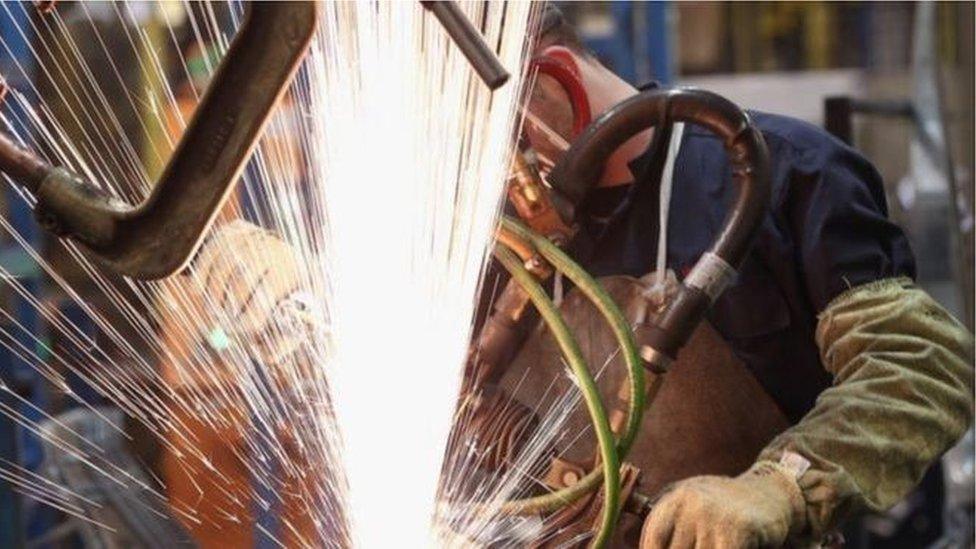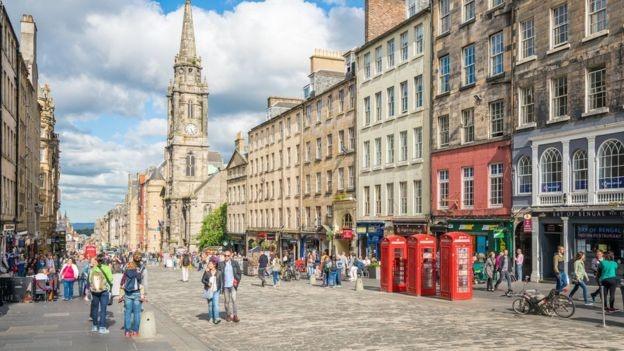How can the economy be 'Built Back Better'?
- Published

The Scottish government will, on Monday, publish the report of its advisory group on economic recovery. It follows a lot of advice on how to rebuild the economy, but with new objectives.
Public service reform is included in the mix. Those who know government best, from having worked at its heart, say it needs turned upside down, with post-crisis planning needed now.
A heavyweight contribution from Professor Ronald MacDonald of Glasgow University urges a new social contract to underpin a new type of economy, and has big ideas for changes in the way we are taxed.
Be sure not to waste the opportunity that comes with a crisis: that's usually sound advice. And with that in mind, the advice is mounting up for how the economy can be "Built Back Better".
In recent weeks, I've been looking at some of the more radical plans, to turn the economy over to wellbeing rather than pursuit of ever more gross domestic product.
With interest from mainstream economists, and the embrace of the Scottish government, it's an idea with the wind in its sails.
From the Left, the Common Weal group of Scottish policy thinkers, has put together their agenda for change, with a view to influencing next year's Holyrood election.
Conflicting directions
For BBC Radio Scotland's Good Morning Scotland programme, I've been looking at ways in which the public sector can learn from the crisis, and continue the rapid pace of reform it achieved in recent weeks, notably in the health service, because it had to.
You can listen to the special report here from around 38 minutes in. It follows a truly inspirational interview with John Reid, boss of the Michelin tyre plant in Dundee, about the 20-month wind-down to closure this month, and how 900 job losses have been handled with humanity, dignity, success in finding new jobs, and even some fun.
Worth noting within the contributions about public services is the view from Paul Gray, former chief executive of NHS Scotland.
He has plenty experience of seeing three-fold obstacles to change: the priority often given to the here-and-now challenge: institutional architecture getting in the way, with people and accountability facing in conflicting directions: and it's always easy to continue what you're doing, in the hope of doing it better.
He takes a lesson coming out of the World War Two: that the Labour government's achievements after 1945 were built on groundwork done during the depths of the conflict. However hard it is to take resource away from the immediate challenge, Paul Gray says the time to plan is now.
Pyramid of power
Alongside him, Sarah Davidson was also at the top levels of the Scottish government's civil service, and now heads the Carnegie UK Trust.
Her insights, from the outside, are that the pyramid of top-down power structures, in which we all collude - from government to council to community, businesses and voluntary sector - should be turned on its head, with government there to underpin the nation's activities.

Tourism is one of the areas that is being affected by the pandemic
She notes that the current crisis forced central and local government to turn to small, local community organisations for the distribution of emergency food supplies. They have told her and Carnegie that they were not taken seriously, but they should be now, in achieving what government at every level could not.
From Prof Sir Anton Muscatelli, economist and Glasgow University principal, there is analysis of how the huge costs for the crisis can be funded. He backed the Scottish government and many others who have been calling for borrowing flexibility for the Scottish government.
That becomes an even more obvious issue with the publication tomorrow (Monday) of the economic recovery advisory group commissioned by the Scottish government from eight people led by former Tesco Bank boss Benny Higgins.
Mr Higgins has already indicated that government part-ownership of companies may be necessary to retain the hard-wiring of the private sector.
Sir Anton, who sits on the advisory group, observes that the crisis has changed our perceptions of the role of the state - having the strength to bail out the private sector, and the clout to invest, as if clearing through the rubble of a major war.
'New normal'
To all this, add a contribution from Prof Ronald MacDonald, external, also of Glasgow University. It's published today, with a taster on the Good Morning Scotland programme yesterday (at 27 minutes in).
It's a meaty contribution about the "post-pandemic new normal", with the economics professor offering no less than a new social contract, embracing wellbeing and tackling inequality with new vigour. In common with every other commentator, he sees the green economy as a vital part of building back better.
Notable because it's discussed only rarely elsewhere, one aspect of change he urges, using crisis as an opportunity, is for a really serious programme of tax reform: reducing tax on jobs (National Insurance) and on goods and services (VAT) and boosting it on wealth, profits on small and medium size companies and carbon.
For some, the big prize is putting tax and benefits together to create a Universal Basic Income. A more modest aim, but one that has evaded Scots politicians for decades, is serious reform to business rates and council tax.
